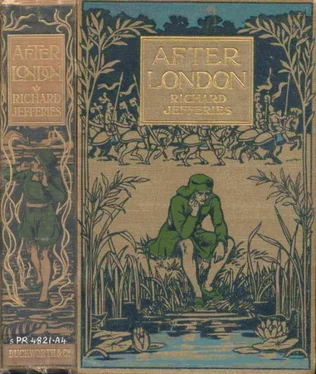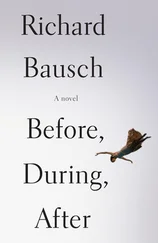Richard Jefferies - After London
Здесь есть возможность читать онлайн «Richard Jefferies - After London» весь текст электронной книги совершенно бесплатно (целиком полную версию без сокращений). В некоторых случаях можно слушать аудио, скачать через торрент в формате fb2 и присутствует краткое содержание. Город: London, Год выпуска: 1905, Издательство: Duckworth & Co., Жанр: sf_postapocalyptic, на английском языке. Описание произведения, (предисловие) а так же отзывы посетителей доступны на портале библиотеки ЛибКат.
- Название:After London
- Автор:
- Издательство:Duckworth & Co.
- Жанр:
- Год:1905
- Город:London
- ISBN:нет данных
- Рейтинг книги:4 / 5. Голосов: 1
-
Избранное:Добавить в избранное
- Отзывы:
-
Ваша оценка:
- 80
- 1
- 2
- 3
- 4
- 5
After London: краткое содержание, описание и аннотация
Предлагаем к чтению аннотацию, описание, краткое содержание или предисловие (зависит от того, что написал сам автор книги «After London»). Если вы не нашли необходимую информацию о книге — напишите в комментариях, мы постараемся отыскать её.
(1885), set in a future in which urban civilization has collapsed after an environmental crisis.” (From
).
This eBook is for the use of anyone anywhere at no cost and with almost no restrictions whatsoever. You may copy it, give it away or re-use it under the terms of the Project Gutenberg License included with this eBook or online at
* * *
After London — читать онлайн бесплатно полную книгу (весь текст) целиком
Ниже представлен текст книги, разбитый по страницам. Система сохранения места последней прочитанной страницы, позволяет с удобством читать онлайн бесплатно книгу «After London», без необходимости каждый раз заново искать на чём Вы остановились. Поставьте закладку, и сможете в любой момент перейти на страницу, на которой закончили чтение.
Интервал:
Закладка:
Brambles and thorns and other underwood had begun to cover the space that should have been open, and young sapling oaks had risen from dropped acorns. Felix pointed this out to Oliver, who seldom accompanied him; he was indeed rather glad of the opportunity to do so, as Oliver had more interest with Sir Constans than himself. Oliver admitted it showed great negligence, but added that after all it really did not matter. “What I wish,” said he, “is that Sir Constans would go to Court, and take his proper position.”
Upon this they were well agreed; it was, in fact, almost the only point upon which all three brothers did agree. They sometimes talked about it till they separated in a furious temper, not with each other but with him. There was a distinct track of footsteps through the narrow band of low brambles and underwood between the stockade and the forest. This had been made by Felix in his daily visits to his canoe.
The forest there consisted principally of hawthorn-trees and thorn thickets, with some scattered oaks and ashes; the timber was sparse, but the fern was now fast rising up so thick, that in the height of summer it would be difficult to walk through it. The tips of the fronds unrolling were now not up to the knee; then the brake would reach to the shoulder. The path wound round the thickets (the blackthorn being quite impenetrable except with the axe) and came again to the river some four or five hundred yards from the stockade. The stream, which ran from west to east through the enclosure, here turned and went due south.
On the bank Felix had found a fine black poplar, the largest and straightest and best grown of that sort for some distance round, and this he had selected for his canoe. Stones broke the current here into eddies, below which there were deep holes and gullies where alders hung over, and an ever-rustling aspen spread the shadow of its boughs across the water. The light-coloured mud, formed of disintegrated chalk, on the farther and shallower side was only partly hidden by flags and sedges, which like a richer and more alluvial earth. Nor did the bushes grow very densely on this soil over the chalk, so that there was more room for casting the fly than is usually the case where a stream runs through a forest. Oliver, after getting his tackle in order, at once began to cast, while Felix, hanging his doublet on an oft-used branch, and leaning his spear against a tree, took his chisels and gouge from the flag basket.
He had chosen the black poplar for the canoe because it was the lightest wood, and would float best. To fell so large a tree had been a great labour, for the axes were of poor quality, cut badly, and often required sharpening. He could easily have ordered half-a-dozen men to throw the tree, and they would have obeyed immediately; but then the individuality and interest of the work would have been lost. Unless he did it himself its importance and value to him would have been diminished. It had now been down some weeks, had been hewn into outward shape, and the larger part of the interior slowly dug away with chisel and gouge.
He had commenced while the hawthorn was just putting forth its first spray, when the thickets and the trees were yet bare. Now the May bloom scented the air, the forest was green, and his work approached completion. There remained, indeed, but some final shaping and rounding off, and the construction, or rather cutting out, of a secret locker in the stern. This locker was nothing more than a square aperture chiselled out like a mortice, entering not from above but parallel with the bottom, and was to be closed with a tight-fitting piece of wood driven in by force of mallet.
A little paint would then conceal the slight chinks, and the boat might be examined in every possible way without any trace of this hiding-place being observed. The canoe was some eleven feet long, and nearly three feet in the beam; it tapered at either end, so that it might be propelled backwards or forwards without turning, and stem and stern (interchangeable definitions in this case) each rose a few inches higher than the general gunwale. The sides were about two inches thick, the bottom three, so that although dug out from light wood the canoe was rather heavy.
At first Felix constructed a light shed of fir poles roofed with spruce-fir branches over the log, so that he might work sheltered from the bitter winds of the early spring. As the warmth increased he had taken the shed down, and now as the sun rose higher was glad of the shade of an adjacent beech.
CHAPTER IV
THE CANOE
Felix had scarcely worked half an hour before Oliver returned and threw himself on the ground at full length. He had wearied of fishing, the delicate adjustment of the tackle and the care necessary to keep the hook and line from catching in the branches had quickly proved too much for his patience. He lay on the grass, his feet towards the stream which ran and bubbled beneath, and watched Felix chipping out the block intended to fit into the secret opening or locker.
“Is it nearly finished, then?” he said presently. “What a time you have been at it!”
“Nearly three months.”
“Why did you make it so big? It is too big.”
“Is it really? Perhaps I want to put some things in it.”
“Oh, I see; cargo. But where are you going to launch it?”
“Below the stones there.”
“Well, you won’t be able to go far; there’s an old fir across the river down yonder, and a hollow willow has fallen in. Besides, the stream’s too shallow; you’ll take ground before you get half a mile.”
“Shall I?”
“Of course you will. That boat will float six inches deep by herself, and I’m sure there’s not six inches by the Thorns.”
“Very awkward.”
“Why didn’t you have a hide boat made, with a willow framework and leather cover? Then you might perhaps get down the river by hauling it past the shallows and the fallen trees. In two days’ time you would be in the hands of the gipsies.”
“And you would be Sir Constans’ heir!”
“Now, come, I say; that’s too bad. You know I didn’t mean that. Besides, I think I’m as much his heir as you now” (looking at his sinewy arm); “at least, he doesn’t listen as much to you. I mean, the river runs into the gipsies’ country as straight as it can go.”
“Just so.”
“Well, you seem very cool about it!”
“I am not going down the river.”
“Then, where are you going?”
“On the Lake.”
“Whew!” (whistling) “Pooh! Why, the Lake’s—let me see, to Heron Bay it’s quite fifteen miles. You can’t paddle across the land.”
“But I can put the canoe on a cart.”
“Aha! why didn’t you tell me before?”
“Because I did not wish anyone to know. Don’t say anything.”
“Not I. But what on earth, or rather, on water, are you driving at? Where are you going? What’s the canoe for?”
“I am going a voyage. But I will tell you all when it is ready. Meantime, I rely on you to keep silence. The rest think the boat is for the river.”
“I will not say a word. But why did you not have a hide boat?”
“They are not strong enough. They can’t stand knocking about.”
“If you want to go a voyage (where to, I can’t imagine), why not take a passage on board a ship?”
“I want to go my own way. They will only go theirs. Nor do I like the company.”
“Well, certainly the sailors are the roughest lot I know. Still, that would not have hurt you. You are rather dainty, Sir Felix!”
“My daintiness does not hurt you.”
“Can’t I speak?” (sharply)
“Please yourself.”
A silence. A cuckoo sang in the forest, and was answered from a tree within the distant palisade. Felix chopped away slowly and deliberately; he was not a good workman. Oliver watched his progress with contempt; he could have put it into shape in half the time. Felix could draw, and design; he could invent, but he was not a practical workman, to give speedy and accurate effect to his ideas.
Читать дальшеИнтервал:
Закладка:
Похожие книги на «After London»
Представляем Вашему вниманию похожие книги на «After London» списком для выбора. Мы отобрали схожую по названию и смыслу литературу в надежде предоставить читателям больше вариантов отыскать новые, интересные, ещё непрочитанные произведения.
Обсуждение, отзывы о книге «After London» и просто собственные мнения читателей. Оставьте ваши комментарии, напишите, что Вы думаете о произведении, его смысле или главных героях. Укажите что конкретно понравилось, а что нет, и почему Вы так считаете.












